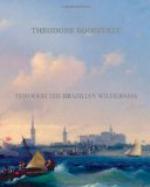On May 1 we left Manaos for Belen-Para, as until recently it was called. The trip was interesting. We steamed down through tempest and sunshine; and the towering forest was dwarfed by the giant river it fringed. Sunrise and sunset turned the sky to an unearthly flame of many colors above the vast water. It all seemed the embodiment of loneliness and wild majesty. Yet everywhere man was conquering the loneliness and wresting the majesty to his own uses. We passed many thriving, growing towns; at one we stopped to take on cargo. Everywhere there was growth and development. The change since the days when Bates and Wallace came to this then poor and utterly primitive region is marvellous. One of its accompaniments has been a large European, chiefly south European, immigration. The blood is everywhere mixed; there is no color line, as in most English-speaking countries, and the negro and Indian strains are very strong; but the dominant blood, the blood already dominant in quantity, and that is steadily increasing its dominance, is the olive-white.
Only rarely did the river show its full width. Generally we were in channels or among islands. The surface of the water was dotted with little islands of floating vegetation. Miller said that much of this came from the lagoons such as those where he had been hunting, beside the Solimoens—lagoons filled with the huge and splendid Victoria lily, and with masses of water hyacinths. Miller, who was very fond of animals and always took much care of them, had a small collection which he was bringing back for the Bronx Zoo. An agouti was so bad-tempered that he had to be kept solitary; but three monkeys, big, middle-sized, and little, and a young peccary formed a happy family. The largest monkey cried, shedding real tears, when taken in the arms and pitied. The middle-sized monkey was stupid and kindly, and all the rest of the company imposed on it; the little monkey invariably rode on its back, and the peccary used it as a head pillow when it felt sleepy.
Belen, the capital of the state of Para, was an admirable illustration of the genuine and almost startling progress which Brazil has been making of recent years. It is a beautiful city, nearly under the equator. But it is not merely beautiful. The docks, the dredging operations, the warehouses, the stores and shops, all tell of energy and success in commercial life. It is as clean, healthy, and well policed a city as any of the size in the north temperate zone. The public buildings are handsome, the private dwellings attractive; there are a fine opera-house, an excellent tramway system, and a good museum and botanical gardens. There are cavalry stables, where lights burn all night long to protect the horses from the vampire bats. The parks, the rows of palms and mango-trees, the open-air restaurants, the gay life under the lights at night, all give the city its own special quality and charm. Belen and Manaos are very striking examples of what can be done in the mid-tropics. The governor of Para and his charming wife were more than kind.




